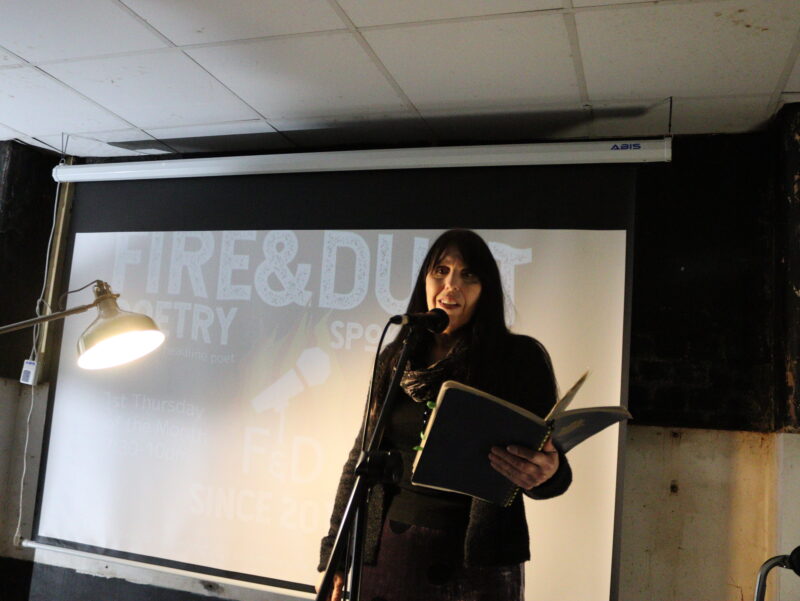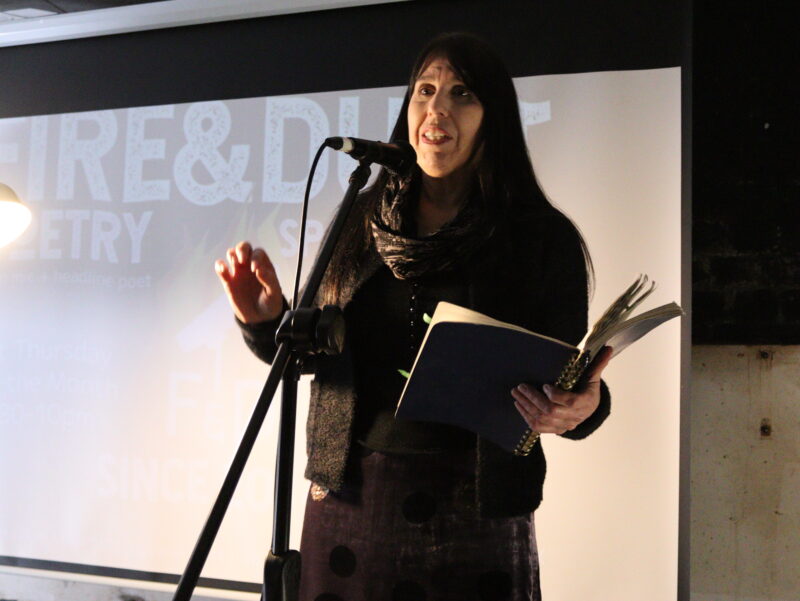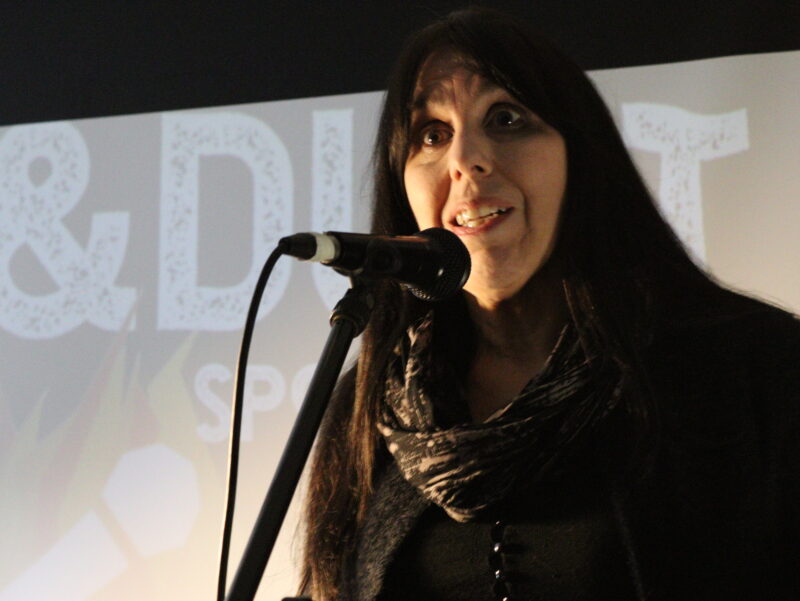INTERVIEW: FIRE & DUST MEETS MORGAN BIRCH
Welcome to Ms Morgan Birch’s Cranial Emporium
Where the sordid and the glorious combine and coexist
It’s a library, a factory, a playground, a laboratory
echoing with oratory and songs that won’t desist
Where the curious meets the furious,
the factful greets the spurious
The mild joins the wild in a labyrinthine twist…

Morgan Birch is a Wolverhampton-based poet who loves to rhyme. She has featured on Brum Radio Poets and also makes regular appearances at Caffe Grand Slam in Dudley. In 2017 she won the inaugural Wolverhampton Literary Festival poetry competition and in 2021, was a winner in the same festival’s ‘Bedtime Stories – Tale for Children’ competition. Since then, Morgan has won the 2022 Shrewsbury Festival of Literature Poetry Slam, was a slam finalist at Ironbridge Festival (2022) and Ledbury Festival (2023) and won the Caffe Grand Slam in August 2023. She lists her most prestigious prizes as a Poundland face mask, Posh Spice’s autobiography and an out-of-date sandwich. Morgan describes her work as tackling a range of subjects, from unsuccessful dating to musical theatre and her personal quest for utter obscurity.
Fire&Dust at The LTB was honoured to be Morgan’s first headline gig on 7th December 2023, where her lively poetry set was well-received by the audience. We caught up with her after the gig, to ask a few questions…
HCE: Tell us a little about your background and journey as a writer so far. What inspired you to start creating and performing poetry?
MB: I’ve always loved to create bits of rhyme, make up alternative lyrics for songs and find different ways to express ordinary thoughts. Things just grab me and set off a chain of rhymes and ideas – it could be a sudden revelation about postcodes, a phrase from a dream, or a child telling me that ‘tomatoes give you earache’ – and I just go with it. It’s a form of mind-candy, really, that borders on compulsive.
My first performance was at a Motor Neurone Disease fundraiser, ranting in rhyme about how much I hated MND. To my surprise, it went down well. After that I connected with Wolverhampton’s Poets, Prattlers and Pandemonialists collective (PPP) and found more opportunities to perform. My timing was bad though, as all this was just before the pandemic when everything shut down or went onto Zoom…
HCE: Your excellent headline set really captivated the crowd. Have you always been a confident performer, or were you nervous when you first started out?
MB: Thank you! Yes, I am a confident performer, to my own great surprise. I’ve absolutely flippin’ loved it from the first time I gave it a go. My first audience was a load of bikers, and they were brilliantly receptive and kind, which helped. I think having taught in primary schools and addressed the occasional conference stood me in good stead. That said, I waited until I was heading for fifty before getting started as a performer. I wouldn’t have been confident when younger.
HCE: Who is your work aimed at – do you have an ideal audience in mind when you’re putting a poem together?
MB: My work is aimed at people who love words (and don’t mind a bit of Anglo-Saxon vernacular), who appreciate satire and silliness, and are prepared to be carried along by rhyme and rhythm. I think there can be a bit of snobbishness about my kind of poetry in some circles, but I don’t let it bother me. My more serious poems tend to be politically left-leaning, so often I feel I’m preaching to the choir at poetry gatherings. Maybe I should do a set in the Conservative Club and see how long it takes before I’m asked to leave…

HCE: Several Fire&Dust attendees mentioned detecting and enjoying an essence of John Cooper Clarke in some of your poems. Are you a fan of JCC’s work? Who or what would you say are the biggest influences on your writing and performance?
MB: John Cooper Clarke is my poetic hero. I was introduced to his work when I was a teenager and found it enormously exciting. I often quote him, see him live when I can, and still love to play ‘Snap Crackle and Bop’ in the car and join in with my favourite bits. I think it’s helped me with my oral dexterity and my ability to string rhymes together. I am happy to have JCC recognised as my main influence. I’m also inspired by my childhood favourite, Spike Milligan, and, in my more serious moments, by Fish from Marillion and Michael Stipe from REM, who bring in a bit of emotional intensity. Recently, I’ve got really into Tim Minchin’s work too – I love his narrative songs and his rhyming fluency, and how he combines intellectual confidence with emotional vulnerability. Victoria Wood would be another performer I’d be happy to say had influenced my efforts at entertaining. I thought she was great.
HCE: Are there any recurring themes or motifs that you enjoy playing with in your work?
MB: I write a fair bit about my love of nature and about protecting the natural environment. I can’t bear to write sad stuff about it though, so it’s usually rants and hymns rather than laments. Friendship is a recurring theme, and animals and birds seem to feature in quite a few of my poems too. (As a practising psychologist, I’d love to write about the fascinating things my clients say and do, but confidentiality doesn’t permit.) I’m aware that certain words and rhymes particularly appeal to me – ‘linger’ and ‘finger,’ ‘line’ and ‘entwine’ seem to pop into my mind quite a lot for some reason. I like my poems to have definite endings, so I have to beware of repeating the same closing phrases. Also, rhyme and rhythm can lead to cheesiness, which I try to avoid.
HCE: Your headline set featured predominantly humorous poems, full of fun observations and witty wordplay. How important a writing device is humour for you, and what purposes do you feel it serves in poetry and performance?
MB: I love humour and couldn’t do without it. Along with kindness, I think it’s possibly the most wonderful of human traits. Now and again, people have suggested that I could do stand-up, but I find comedy audiences a bit merciless – almost as if they want to defy your attempts to make them laugh. Poetry audiences are often quite receptive to humour, but if you don’t get a laugh with a poem, you can still imagine that the listeners are impressed by your linguistic fireworks, or that they gain something from your message and meaning. I think humour releases tension, and it allows you to deal with uncomfortable topics in an accessible way. A good laugh is a bit of respite from the pervasive negativity of our times. I do worry a bit though, that if I’ve done a mostly-humorous set somewhere, I’ve set myself up as a ‘funny poet,’ and that my more serious stuff will be disappointing. Finding a balance is something I’ll be working on as I go along.

HCE: Your poem ‘My Mate’s Gone South’ explores the topic of class differences. Do you think literary scenes and communities are doing a good job of spotlighting and celebrating working-class poets, in particular working-class women poets – and if not, what are some approaches to it they could take to improve this?
MB: I’ve written a few poems that address class in various ways. Class bothers me as it’s hard to define and talk about, so class-based prejudice can quite easily hide in plain sight and go unchallenged. I don’t identify strongly with the working-class identity, having had a few advantages as a result of upwardly-mobile parents, but I relate to the struggle for recognition and opportunity. Maybe literary communities can help to spotlight working-class talent, but I suspect that poetry in general has less clout than music, particularly for younger people. I think that working-class women poets are swimming against a very powerful tide, and so need to stick together and keep kicking! Where one does start to pull ahead, they need to extend a hand and bring others along. I see that happening in Wolverhampton, with our strong female Laureates and determined women in writing groups. What I’d like to see more of is encouragement and opportunities for younger poets, particularly those from all disadvantaged starting-points. I’m trying to do my bit by running a weekly writing group in my school. Confidence-building is the vital element. The talent is already there.
HCE: Congrats on your various slam wins! Any top tips for open mic-ers planning to venture into the slam poetry scene? What are some essential ways to prepare for a slam?
MB: Slams are tricky beasts! You have to go into them with your eyes open to certain facts. One: the judging will vary wildly between slams. It can seem arbitrary or incomprehensible. Great poets can be knocked out in the first round; poets you think did really well don’t win, and those you didn’t really ‘get’ may do brilliantly. Two: some people will perform deeply personal poems on very serious themes (like mental health or sexual abuse). If you are performing something light-hearted, you could feel that your stuff is trivial in comparison. You may then feel guilty if the crowd or the judges like your stuff more (or is that just me?) Three: This is controversial, but men seem to win a lot of slams. Women and others may need to be extra brilliant. (I wrote a poem about this phenomenon called ‘One Language is Not Sufficient to Express my Irritation.’) That said, slam audiences tend to be nice (in my experience) – there to enjoy your work, not to critique it. They’ve come for entertainment – they want to see a performance, so prepare, prepare, prepare! Time your poems, write your ‘spontaneous’ intros in advance, and watch how the mic-stand works. Above all, don’t apologise for your work or run it down. Enjoy slamming and don’t take the results too seriously (she said, still fuming over the odd one here and there…)
HCE: What type of poetry do you seek out for personal enjoyment? As a reader/listener, when you engage with another poet’s work, what are you hoping to get out of it?
MB: I love poets who can judge exactly how much to give you, those who don’t overload you with words or images, and who leave a little to the imagination; those who intrigue, who give you abstract brushstrokes rather than fully coloured-in outlines. Liz Berry, with her powerful earthy magic; Jen Hadfield, who looks from some fascinating perspectives and sees the remarkable in the everyday; Donna Stonecipher with her unsettling but compelling vision of life and place. When I read poetry, I want to feel my feet on the ground while my mind goes soaring off somewhere new. All of the poets I’ve named have been featured in Frank Skinner’s Poetry Podcast. I find him a good guide. That said, he hasn’t featured John Cooper Clarke yet, to whose words I will always return.

HCE: In your opinion, is Wolverhampton a good place to be a poet/writer? Does it have a thriving spoken word scene?
MB: I think Wolverhampton is a good place to be a poet or writer. We have a thriving annual Literary Festival which attracts some high-profile authors and poets, and there are several well-run gatherings for performers in Wolverhampton and nearby bits of the Black Country every month. Various workshops and courses pop up at times, notably the PPP ‘Arses from Elbows’ course, which I think is gloriously named. There are local writing groups that do a good job of creating communities of writers, (though I don’t attend any because I act out my poems and prose as I create them, which would be embarrassing for all concerned). Hopefully people are increasingly coming to recognise that ‘Wolverhampton’ and ‘culture’ belong together in the same positive sentence.
HCE: What’s next on the horizon for you? Are you already working on projects/booked for upcoming performances/applying for other slams?
MB: I’m hoping for a place in the Wolverhampton Lit Fest Slam in February 2024, and maybe in one or two more during the year. I’ll carry on with the local open mic events (PASTA in Wolverhampton, Caffe Grande Slam in Dudley, Voices from the Fountain in Walsall) and remain available for any headline opportunities that I might be fortunate enough to be offered. However, I’m being haunted by the novel that I completed a year ago and need to revisit for a structural overhaul before trying for publication. I also want to create videos of a series of gender-free children’s stories that I’ve created, called ‘Five Acts of the Quing,’ and add a few more poetry (and maybe even music) recordings and videos to my YouTube Channel. Maybe I’ll try to put a poetry collection together…but what with writing projects at my school, and another novel mentally brewing, it’s a case of ‘so many projects, so little time’.
HCE: What’s the best way for people to keep connected with you and your work, or contact you for bookings?
I can be contacted via Facebook (look for the magpie logo). Some of my work is on YouTube – ‘Morgan’s Poetry Place,’ again, with the magpie logo. Maybe I should get a website… I’ll speak to a young person, they’ll be able to advise me, I’m sure.

HCE: Is there anything we didn’t cover that you’d like to share with our readers?
MB: Just what a great event Fire & Dust is and how honoured I was to perform there. Thanks for the opportunity and the great entertainment. (I’ll be back…if you’ll have me!)
